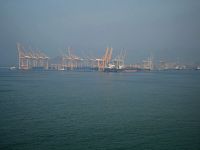Israel sounded upbeat Thursday over remarks by US President George W Bush on the Mideast conflict, and sources said that it would re-occupy Palestinian lands if President Yasser Arafat declared an independent state at an upcoming UN General Assembly meeting.
According to AFP, Israel exulted over Bush's remarks delinking the war in Afghanistan from the crisis in the Middle East, while Palestinians showed flashes of anger at Washington's apparent effort to distance itself from the problem.
Bush said late Wednesday that the international alliance he was leading against terror suspect Osama bin Laden in Afghanistan would succeed "peace or no peace in the Middle East."
According to the agency, the comments marked a public change for Washington, which had been urging its ally Israel to reluctantly accommodate itself with the Palestinians, to avoid driving a wedge between the United States and Arab backing that will cushion its war on Afghan Muslim fundamentalists.
"There is no way whatever in which our action in Afghanistan is conditional on progress in the Middle East," said British Prime Minister Tony Blair, who had been discussing the war effort with Bush in Washington.
The comments were applauded by Raanan Gissin, spokesman for Israel's right-wing prime minister, Ariel Sharon.
"That was our position all along, and we welcome that statement. Bin Laden said all along that his real target was the United States," he told AFP.
Chief Palestinian negotiator Saeb Erakat was guarded in his reaction, said the report.
"The international coalition against terrorism is good, but it is not enough, because there is still the Israeli occupation of Palestinian territory," he said.
Palestinian deputy Kamal Al Sharafi was more outspoken in his criticism of Bush.
"These words emphasize the lack of seriousness on the part of the American president towards the Palestinian-Israeli conflict and the lack of awareness that the attacks suffered from on Sept. 11 are related to the Palestinian problem," he told AFP.
"The Palestinians and the Arabs are not reassured by these words as to the seriousness of the United States," said the Palestinian parliamentarian for Jabalia in the northern Gaza Strip.
Meanwhile, the Tel Aviv-based Haaretz newpaper quoted diplomatic sources in occupied Jerusalem as saying Thursday that if Arafat was to unilaterally declare a Palestinian state, Israel would react by annexing large swaths of land in the West Bank, and possibly in the Gaza Strip.
The areas that could be annexed would be security zones and the settlements including "the Jordan Valley in its broadest form." However according to the sources, Israel doubts that Arafat will declare a state during his upcoming speech at the UN General Assembly next week.
Senior figures in the Palestinian Authority have also denied that Arafat is to declare a state, said the paper.
Israeli Foreign Minister Shimon Peres is to meet Thursday in Sweden with the speaker of the Palestinian Parliament, Ahad Qorei’, also known as Abu Ala, before returning to Israel. Peres is to meet with Prime Minister Ariel Sharon Friday to continue drafting a proposed joint peace plan.
EU DRAFTING NEW MIDEAST PEACE INITIATIVE
Haaretz also quoted Palestinian sources as saying that European Union leaders had put together a new Mideast peace initiative, which Blair presented to Bush during his visit to Washington Wednesday.
Palestinian Cabinet Minister Nabil Shaath told the Bahrain-based newspaper Al Ayam that the plan was presented to the Palestinians and welcomed by them. Shaath added that the Saudi foreign minister would try to convince the US administration to accept the plan.
According to the newspaper, the plan consists if two parts. The first is a diplomatic section which deals with the establishment of a Palestinian State, the end of Israeli occupation and a solution of the problem of the refugees based on UN resolutions 242 and 383. The second part deals with security issues, the implementation of the Mitchell and Tenet resolutions, and the deployment of international monitors in the area.
However, said the Israeli paper, high-ranking political sources in Jerusalem say that Israel continues to oppose European intervention in the Palestinian-Israeli conflict. The continued objection to international monitors, the sources say, stems from Israel's belief that European governments are biased towards the Palestinians and observers would only serve the Palestinian cause – Albawaba.com
© 2001 Al Bawaba (www.albawaba.com)







